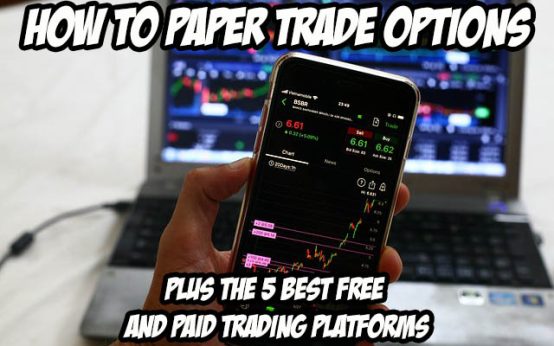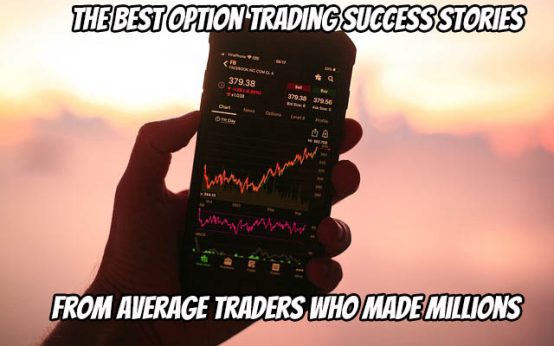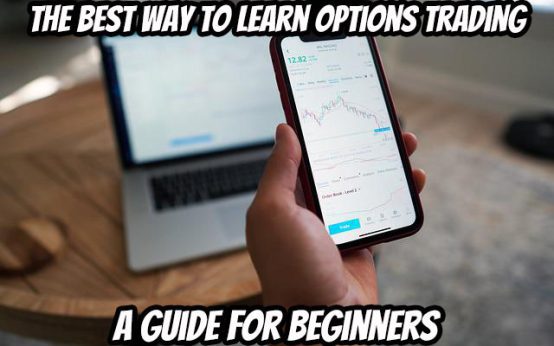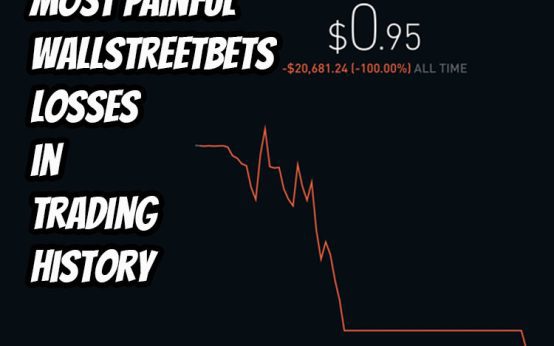Wondering what does it mean to trade options?
Options trading can be a great way to diversify your investing portfolio. However, for those who are unfamiliar with the process of options trading, it may seem difficult and confusing. This article will provide a brief explanation of what an option is and how they work so that you can feel more confident about using this investment strategy in your own life.
What does it mean to trade options?
 Simply put, it means to buy or sell options, which are financial derivatives with the rights to buy or sell an underlying stock at an assigned price on a given date in the future.
Simply put, it means to buy or sell options, which are financial derivatives with the rights to buy or sell an underlying stock at an assigned price on a given date in the future.
The basics of trading options – The different types of options
There are a few basic things that you need to be aware of when you’re looking to start trading options.
In this section, we will go over some of the basic aspects and terminology when it comes to trading options.
What is a call option?
A call option is a contract that gives the owner the right, but not the obligation, to buy an asset or follow from another party at a set price within a certain time frame.
Thus when trading stocks for example, owning shares of Exxon means you own what’s known as ‘equity’ in Exxon which includes voting rights and access to dividends; owning a call option on Exxon doesn’t entitle you to vote or earn dividends and only entitles you to purchase equity in Exxon at the set price within a certain period of time.
There are two types of call options: American and European (a European-style put option is similar). An American-style call is exercisable anytime up until expiration day. European options are only exercisable on their expiration date.

What is a put option?
A Put Option is used for stocks, futures or indexes. A person would use this if they are expecting the price on these items to go down in the near future.
Just like with a call option, a put option is a type of stock market derivative that conveys rights, but not obligations to buy or sell an underlying asset at a predetermined date for a preset price. Options are issued by financial institutions on behalf of others who do not want to expose their inventory risks to changes in exchange rates while still receiving some return on the value fluctuations over time without actually transferring ownership of anything or bearing any risk themselves.

How Do I Get Started Trading Options?
 Be sure to have a good understanding of the basics before trading.
Be sure to have a good understanding of the basics before trading.
Options are traded on an exchange. The best way to get started trading options is by first doing some research into how they work, what sort of things can be done with them, and how they compare against other investments.
The nature of the option trade favors traders who buy options to speculate rather than those who want to use them as hedges. As a result, most people find it advantageous to sell call or put options instead of buying them because brokers are willing offer higher payouts for the sale of these contracts even if the market moves very little.
But in order to trade options, you just need to open a brokerage account, deposit enough money to be approved for trading options, and then start trading.
How to Read a Stock Option Quote
 The stock options quote is called an “options chain.” And reading it isn’t much different than if you were buying regular stocks.
The stock options quote is called an “options chain.” And reading it isn’t much different than if you were buying regular stocks.
There are 2 sides to options trading: calls and puts (which we have already gone over).
For the basics here, we are going to just look at buying options (not selling them) just to keep it simple.
First we have the strike.
The Strike Price
The strike price in options trading is the price at which the owner of an option can exercise their option.
The holder usually has to pay a premium to purchase an option, and this amount will be lower if the strike price is higher.
If the strike price is lower than the current price of the stock, a call option at that strike is said to be “in the money.” At the same time, a put option would be “out of the money.”
On the other hand, if the price of the stock was below a certain strike price, the put contract at that strike price would be in the money and the call would be out of the money.
When you’re buying puts or calls, you want to be “in the money.”
Bid & Ask Prices
The bid and ask prices work the same as with regular stocks. These are the prices at which buyers are willing to buy and sellers willing to sell for a specific call or put contract at a certain price.
Expiration Date
Finally, you have the expiration date when the option contract will expire.
How far away from the expiration date you’re buying the contract will greatly influence the stock price.
Final Thoughts
So those are the basics when it comes to trading options.
The biggest thing that you should keep in mind is that you need to learn and educate yourself before jumping in to trading.

Other questions people often had when searching for answers to what does it mean to trade options
What are options in stock trading?
Options in stock trading allow the purchaser to control a certain amount of a stock at a predetermined price for a pre-specified length of time. The options will be either long or short, give the person who owns those options their choice as to whether they want an increase or decrease in equity under those specific circumstances.
Unless the person chooses otherwise, options expire after 10 years from when their contract is entered as specified by law. In addition, as soon as it becomes profitable for that option holder to sell all rights and obligation associated with that particular contract back into that market.
Are options better than stocks?
Yes. Typically, you would be better off with stock options until expiration day. If the underlying asset is trading at $10 and it bounces to $15 before option day (for example), then the option will expire worthless. You can’t earn money on an option like that unless it’s in-the-money. So if you sell the stock before expiration day ($10) for $180 ($180 – ($150/share)*100 shares), you’ll make more than selling out of the shares ($150-$11*100 shares).
What is options trading example?
Trading goods or futures contracts with the intent to make a profit over time.
An options trade is an investment that may be entered into by one party for speculation or as protection under certain conditions. The trader takes on risk about the future value of the underlying asset (a stock, bond, commodity, etc.), but has acquired hedging instruments at a lower cost than entering into a short position. If all goes well and gas prices do increase as you forecasted, you’ll buy back your option at a considerably lower price and potentially let it expire worthless and unused so there’s no loss.
Is it worth it to trade options?
If you are well-informed about options trading, there are many benefits to it. You can profit from either a rise or fall in the price of an asset.
If you’re not sure what your trying to accomplish with trading, it’s not worth learning about this type of investment/gambling strategy. First off, there are no guarantees that anyone who trades options will ever be successful because the underlying assets they trade have historically fluctuated wildly in value without any form of regularity whatsoever. Second, even if you do succeed at options trading by luck alone- chances are…you’ll lose all your money just as easily!
Can options make you rich?
Yes, options can make a person rich if a stock option is exercised during the time frame of the option.
Consider this example: You purchase a 100-share lot at $100 per share for a total cost of $10,000 and sell it one year later for $115 per share. This means you have made an extra profit on the sale of your stock by exercising your options from when you purchased it which would have resulted in an additional profit from buying back those shares at market value ($115) less the cash investment to buy those shares which originally totaled to $10,000 plus interest on that money invested over year ($5). The risk with exercising these things is what happens to that stock after exiting it.
Do day traders use options?
Yes, they use both.
Day trading means trading stocks every half hour to every few hours. Options are contracts where you buy the right to buy or sell something at a certain price within the next year or so.
Options are used for short term day traders because it’s easier to have control over your investment due to the limited time frame of options. The contract not only determines when you can buy but what you can purchase as well – for example, what color sneakers will be fashionable in two years. And because education about how an option works tends to be much more thorough than with stocks, even if options aren’t traded often, there is still enough information available that makes them intriguing investments for beginners and experienced traders alike.
How much money do you need for options trading?
First off, you need to check with the broker you are considering. After that, it depends on what type of contract you are looking at. For some contracts, markets only trade for a few minutes out of the day which means your costs will be lower while for others more people will be involved in trading.
There’s also something called time decay which is basically when the length of time until expiration affects how much money you might make or lose based on whether you are “long” or “short”. A long option would have less time before being worthless so they get more expensive – but if they’re worth it then awesome! If short then awesome!
How do you trade options with little money?
Generally, to trade options with a small account you should stick with the major stock indexes. The best stocks for trading purposes are those that have a low number of shares per dollar and a high volatility index. These two factors combine to make these options more profitable because they trade fewer shares but charge higher premiums.
The more volatile the underlying market is acting on your options, the better chance you’ll get great rewards on your investment — but also an increased risk of losses too. Your margin requirements will be raised when there is higher volatility in the market; this can result in difficulty if it exceeds 50% of what you originally deposited for this type of trading.
How do you succeed in options trading?
It requires first that you use risk-management techniques like stop-losses, limit orders, and the “safer” trades (puts vs. calls) to help you sleep at night.
To trade options successfully is a different beast altogether from trading stocks or Forex, but it also relies on a logical, research heavy system that is subject to live market volatility in addition to your emotions.
Are puts riskier than calls?
Yes.
Regardless of everything you may have heard, the truth is that puts are much riskier than calls. Put prices go up as the share price goes down, while call prices go down as the share price goes down. This asymmetry translates into potential for significant losses or gains. If you buy a put option for exercise with a strike price of K and your stock falls below K then you can exercise your right to sell at K but it’s unlikely that this will make up for losses incurred trying to make ex-date profit relative to relative loss protection–assuming P/L comparison was part of trader’s calculus in terms of whether or not they should sell at day 1.
Is selling options still worth the risk?
Selling options is still worth the risk, but it may be wiser to use what are called “riskless” transactions.
While you might not profit much (or maybe any) profit, you can at least protect your investment by setting up a riskless transaction.
A ‘riskless’ transaction is an almost-guaranteed profit to where one party sells their assets to another for less than they’re worth now in exchange for cash up front or now and some other yet unknown future event. The idea here is that there has to always be someone who sees value in what you have more than what they offer so committing yourself before seeing these numbers will put you ahead of the game, even if only by a few cents.
Can anyone do options trading?
Yes.
Again, though, there are some other things to keep in mind. Options trading is for more experienced traders because of its inherent complexities and risk management considerations, higher cost to trade options compared with stocks, the chance of losing money on a trade that expires worthless if not managed correctly, etc.
Can I day trade options without 25k?
No, you cannot day trade options with less than $25,000 in your account.
Further information to include in the answer: Trading options is a risky investment when it comes to capital because when they are out of the money, they are worthless. This means that without 25k in your account you could potentially lose all of it by risking everything on one binary option position.
Recall that if an option is worth “in-the-money” then it has intrinsic value and time value built into its price. It would require at least twenty five thousand dollars since this is the only way to avoid risking every last penny in one trade by hedging or using other tools like spread trading or scaling into positions over time.
What is the riskiest option strategy?
One of the riskiest options strategies is to sell naked calls.
Naked call SPX (S&P 500 Index) strategy funds are futures funds that buy S&P 500 index options and sell no other contracts or securities. When you make 100% on your time, you get out of the trade, because on top of losing on market declines, these funds would lose on total capital losses on any decline in the underlying index. So when there’s a big decline, like last year with markets down more than 20%, these funds come close to or go into bankruptcy.
Why do most options traders lose money?
It’s because they don’t have a management strategy in place to help them turn their bad trades into wins.
A common mistake investors make is believing that the objective is to avoid losses, rather than to take risks with the goal of earning profits. This leads many investors into taking too many risks without having an adequate technique for managing their risk-taking which inevitably leads to losses for all involved. Once again, it comes back to knowing when to take risks and when not too, but that can be hard if your head is spinning from trying to always understand what you should be doing at all times. The remedy? Simple -formulate a plan!
What are the requirements to trade options?
1) Trade strategy – some strategies are not options-worthy.
2) Margin requirement – a deposit is often needed to lower the amount of risk.
3) Spreads or premiums – some stocks have more closely matched prices, which makes it more feasible to trade options with narrower spreads.
4) Investable market size – there has to be enough liquidity in order for trades to be executed quickly and efficiently. In particular, that means that instruments must routinely trade about 100 shares a day. For example, an instrument worth $10 per share cannot be traded on if its average daily trading volume is less than 10 shares since each transaction will cost you $500 plus commission fees.
Are options good for beginners?
They are great for beginners. There are many reasons why.
Some options traders use the cash-to-currencies market to convert their goods or savings into something more liquid, while others use it as a way of earning money on changes in the exchange rates themselves.
How difficult is options trading?
Options Trading is a difficult but rewarding way to make money. In the simplest of terms an option is merely a contract that will provide you with profits if your chosen investment or share price goes down, and whose value decreases as time has gone by.
At its most basic, opting can sound like a great idea–if something goes up in value, you have 100 shares of that company invested at $25 apiece and it jumps to $50 per share. You reap a 400% gain on each one of those shares just by “exercising” the call options you previously bought for around 20 cents per share.
Which is the best option trading strategy? What are good options to trade?
Arbitrage trading.
Some argue that the best option trading strategy is to bet on volatility by buying puts on undervalued stocks and shorting overvalued ones. If this is your desired tradeoff, then you may prefer the strategy of “calendar spreads.” This approach involves buying an out-of-the-money put (to be assigned at some date in the future) and selling an out-of-the money put with a later expiration date. A calendar spread will always result in earning twice as much for each dollar risked, because one of its options expires worthless while another one yields a profit if assigned–in either case the trader gets more than double his or her investment back.
Which broker is best for option trading?
Questrade is an online brokerage that focuses on online trading. They offer very low rates, unlimited activity in stocks and ETFs with no commissions, global market access with foreign currency markets via competitive pricing, commission-free ETF trading for U.S investors, placement trades (once setup), margin to borrow against one’s portfolio up to 75% of the balance or $25 000, trade size limit restrictions depending on account type and compliance obligations).
Do puts lose value over time?
No. This question is an oversimplification of all of finance, but it’s correct in some ways. A stock has the potential to go up on good days and down on bad days, but that doesn’t necessarily mean that on average it will decay or decrease — its value can remain the same if nothing on average changes about it. This is because a company’s market cap rises when its stock increases in price even more than its earnings rise (and vice versa), so over time these two variables could cancel each other out and just leave the company at a fixed size point with no change in valuation even if the earnings don’t move up or down for any reason.
Can you lose money buying puts with tasty trade options?
Yes. Buying protection against a stock in the future to protect against losses is in fact buying insurance, and this insurance does cost money to maintain unless you are in league with magical wonder elves.
Buying puts is essentially the same thing as buying insurance on a car or health care for your future self, but instead of protecting against damages due to accidents or disease, it protects against potential losses if the stock moves downward. If you buy one put contract at $4.00 per share then that’s $1,000 invested into that particular trade if that company’s share price moves down below $4.00 per share.
What happens if my call option expires in the money?
If a call option expires “in the money,” it means that on the day of expiration, the stock on which this particular call option is based was worth more than the strike price. That would mean that if you had bought a call option to purchase 100 shares of Walgreens at $7 per share as an insurance policy for your portfolio, Walgreens would need to pay you $7 x 100 =$700 before the time came to make good on their end of the contract.
In other words, if you had been betting on Wall Street and successfully predicted an increase in Wall Street prices (the same for stocks), then when your options expire they will be worth more than what you paid for them.
Is an option an asset?
It depends on how you define the terms. If you mean “An option is a contractual right granting its holder to buy or sell a specific kind of asset,” then it’s not an asset, because the asset only becomes possessed when cash changes hands. If you mean “An option may also have value in addition to its designated underlying security,” then yes, it’s an equity-like item that can be traded independently from its associated instrument. In this sense, options are often called derivative securities because they derive their value from another security. In this case, an investor can profit even if the price of the underlying security stays level by buying and selling options rather than trading in actual stock market shares or physical commodities themselves.”
How do I start learning options trading?
I would recommend joining The Empirical Collective.
Aside from that, I find “For The Beginner” books are always a great place to start because they are very easy to comprehend for beginners. Option strategies can indeed be quite complicated so if you have zero experience, I have found that beginner books are essential. You will need 10x more time to try and understand them after being introduced via a “For The Beginner” book but at least you won’t lose your shirt when it comes time to dig deeper into what exactly your broker means by naked calls or why adjusting implied volatility levels is important for options traders!
Can you lose more than you invest in options?
Yes, it is theoretically possible to lose more than you invest in options. In fact, it is very probable that an options strategy will eventually result in a loss, even if one employs the tightest trading rules.
Why? You can be right (that is, your prediction of how the market will go) 100% of the time and still end up with losses. The reason for this seeming paradox is that simply being right about what’s going to happen doesn’t guarantee something; you need to also know when something’s going to happen (or be able to time it).
Why do people fail options trading?
Option trading is a difficult strategy to master for beginners, and just like any investment it takes an understanding of the basics. 90% of the people who fail at options trading are those trying to make a large amount over a short period of time, abandoning their plan and do not know what they were doing in first place. This usually causes panic and causes them to lose even more money. But 10% may be due to inexperience or not knowing enough about how option trading works enough before making trades.
Why do 90 percent of traders fail?
1. They begin trading without a system and don’t know when to take profits or cut losses, which is critical in fixed-return investments such as stock trading.
2. Traders get caught up in the search for the fastest return from their investment, to recoup their investments quickly before other traders can take advantage of declining prices. The cycle repeats again and again–fast returns that only lead to low returns because of increasing risk exposure.
3. Self-confidence/Overconfidence often leads to unrealistic expectations about what a person’s skills are worth financially, leading them into high-risk trades with considerable downside risk.”
Is options trading Better Than Stocks?
No. Options trading is a great way to leverage your gains, but there’s a lot of risk that comes with it. Options trading is not better than stocks because the risk-reward curve is reversed.
When you buy an option contract, you get more opportunity for profit if the price of the stock goes up and lose money if it goes down. Inversely, when purchasing a call option for example on 100 shares of XYZ company at $100 per share, you make money if XYZ trades above $120 by expiration date or your shorting costs exceed what you would have made from just buying 100 shares at a higher price in a “buy & hold” scenario.
How do you avoid losing money trading options?
There are a couple of ways to reduce your likelihood of losing money trading options. First, you could buy an option as close as possible to the time that you plan on exiting it. Secondly, if you know that stock will either go up or down, then buy the appropriate type of option contract instead of both. Thirdly, trade in moderation and never be overleveraged because large losses can wipe out an account quickly and permanently.
Lastly, and most importantly: learn what you’re doing first before entering markets with lots of leverage. Getting expertise in fundamental analysis is crucial for making smart investments with low risk and high reward potentials.
Do you need approval to trade options?
To trade options, your broker must approve and allow you to sell or buy any number of options at a certain strike price.
A broker will only approve you to trade if they determine that you have an understanding about the risks involved. Additionally, how much money they might let you invest in options depends on experience and work credentials. They don’t want someone who isn’t experienced in investing- such as a novice trader- gambling their hard earned money away with investments they know little about. If the broker approves, then yes, approval is required for options trading.
Is it bad to hold options over the weekend?
Of course not!
In options you have the right for a certain period of time to buy or sell an asset at a preset price. It doesn’t matter when during that timeframe you choose do this, it’s all about what the market is going to do up until their expiration date. Options traders don’t want anything more than good market conditions, so – although it may have been “bad” the last time they held them over a weekend – if this option expires with good market conditions then they made money and that’s all that matters.
Is selling puts a good strategy?
The strategy of selling Puts can be a great long-term strategy for someone who is cautions with their money.
Some examples are if you have a stable company, you put adds to make money off people who would want it to go down. This way the person gets paid for this risk, it can be any number of transactions or hours per day worked. Meanwhile, you get better stocks because the one they bought out goes up selling puts may not be for everyone but should at least have some other sources of income besides just waiting on your offer to expire.
How much money do you need to start trading options?
To trade options, you’ll need to round up $1,000 to place the order. This is also commonly known as “Margin”.
How to do options trading on td ameritrade
TD Ameritrade offers a variety of options trading tools that can be used to protect investments or speculate on potential stock moves. Investors have access to two broad types of option trades: calls and puts, which can also be used for hedging. At TD Ameritrade, you’ll find all the helpful information you need from how-to videos and educational articles to one-on-one customer service available at our InvestorHelpDesk.
TD Ameritrade is an investing powerhouse with over 4 million accounts and the ability endow both amateur and experienced investors with unparalleled investment opportunities in stocks, ETFs (exchange traded funds), options, futures, forex (foreign exchange) and bonds.
How to start trading options on robinhood
You can trade using Robinhood, three steps:
1. Set up account with your email and phone number.
2. Deposit money into your account via debit card or bank transfer.
3. Buy stocks for between $0 and $9 per share and get free stock trading!
You can also buy stocks for any price or sell shares of any price you’ve already paid for – there are no trade restrictions on the app! There is a requirement to be 18 years old in order to open an account with Robinhood, but according to their disclaimer there are some exceptions when minors have permission from their parents if applicable laws allow this option).
How to do options trading in Canada
You need to open up a special brokerage account at one of the major Canadian online discount brokers to trade stocks.
Options are essentially an agreement between two parties that runs over a fixed period of time (a month, quarter or year), for which one party (called the holder) has the right, but not the obligation, to buy or sell an underlying stock asset (such as shares of IBM) if certain conditions are met. The price at which these contracts can be bought and sold during their existence is known as its “strike” or “exercise” price. You would say that someone who buys an option contract is long on options; whereas someone who sells one is short on them.
How to do options trading in fidelity
Trading options in Fidelity is surprisingly easy.
First you will need to set up an account at your desired broker. An example of a good beginning broker would be ThinkorSwim, but this isn’t necessarily the best option- so do some research before making a decision on where to put your money!
Next, open an account with that broker and deposit proceeds into that banking institution. You cannot work in the stock market without having cash available for trade- you have to have it regardless of how much or little you’re ready to invest initially.
Also open up an account with Fidelity. Choose either their standard brokerage option, preferred trader plan, or VIP program based on what pricing structure works best for you.
How to start trading options reddit
For many options strategies, especially delta-neutral strategies, there are no “right” or “wrong” combinations. There are just situations when they are more likely to work out well–and situations when they are less likely to work out so well. Traders with sufficient risk tolerance can feel confident crossing back and forth between the two in pursuit of their own edge in terms of selecting the best environment for their strategy.
How to do option trading in upstox
The process of buying an option can be thought of as “buying the right to buy” the underlying asset at the pre-determined strike price.
Options are either put or call options, which respectively give you, for an agreed time frame, the right to sell or buy something at a certain price during that time frame. Once you have bought an option if it was a call option then after sometime has elapsed you have access to buy that thing on all future dates during that stipulation period. This is called exercising your call option. Options are normally issued by companies and available for purchase on exchanges by traders looking for hedging strategies against uncertain movements in prices of stocks etc.
How to start option trading in zerodha
In order to open a trading account with Zerodha you must have an Indian account.
In order to register these various KYC documents to start this process, you need to visit one of the nearest zerodha offices in your location.
Your passport and Aadhar Card are a few examples of the required KYC documentation needed for this registration process in relation with opening an account. You also need a PAN card that validates your ministry ministry status, which is often only available through attending what’s called a Permanent Account Number (PAN) camp in India.
What is most important option trading?
The most important option trading is intelligently choosing expiration dates.
Information to include in the answer:
Option trades can be short term (until one set date) or long term (indefinite, until either profitable or sold).
The profit and loss on an option trade depend on which position it’s entered into – whether they’re a call, put, bull put spread, bear put spread, backspread etc. When you buy a ‘call’ option for example the maximum profit would occur if the underlying security at expiration was greater than its strike price. If they stock were equal to or below its strike price then there would be no profits or losses made.
Puts work similarly with you buying them as opposed to

 How to Paper Trade Options – Plus The 5 Best Free and Paid Trading Platforms
How to Paper Trade Options – Plus The 5 Best Free and Paid Trading Platforms  The Options Trading Mentor: Here’s How to Find the Best One for You
The Options Trading Mentor: Here’s How to Find the Best One for You  The Best Option Trading Success Stories from Average Traders Who Made Millions
The Best Option Trading Success Stories from Average Traders Who Made Millions  The Best Way to Learn Options Trading: A Guide for Beginners
The Best Way to Learn Options Trading: A Guide for Beginners  Here’s The Top WallStreetBets Sentiment Tool on The Market
Here’s The Top WallStreetBets Sentiment Tool on The Market  The Biggest and Most Painful WallStreetBets Losses in Trading History
The Biggest and Most Painful WallStreetBets Losses in Trading History